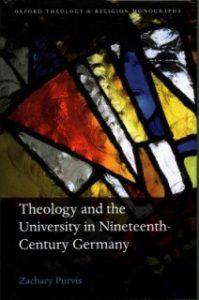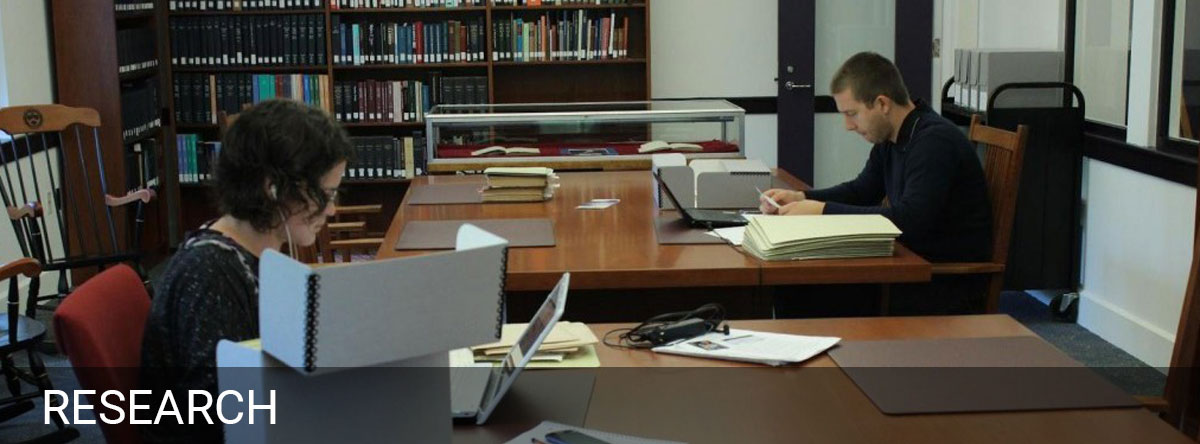
Purvis, Zachary, Theology and the University in Nineteenth-Century Germany, Oxford Theology and Religion Monographs (New York: Oxford University Press, 2016), 336 pp. $100.00 (hardcover).
Reviewed by Calli Micale (June 15, 2017)
In a recent blog post for Oxford University Press, Zachary Purvis describes the dwindling state of European universities at the end of the 18th century:
In the late 18th century, universities as institutions appeared on the brink of collapse. The Enlightenment, the French Revolution, and the Napoleonic era subjected universities—and theological faculties in particular—to an unrelenting onslaught of hostility. As the armies of the French Revolution spread across Europe, they seized university endowments for the state and suppressed theological and other faculties in favor of specialized professional and technical academies. (Zachary Purvis, “The University: Past, Present…and Future?” Oxford University Press Blog, October 16, 2016)
Despite the precarious situation of higher education, the simultaneous, emerging phenomenon of encyclopedia (Encyklopädie) expanded academic possibilities. Encyclopedia allowed for a new perspective of the whole. The mass collection of data provided scholars the ability to diagnose knowledge gaps and recognize patterns on a grand scale. The encyclopedia became a vast mirror of not only the nature of the university, but of the sum knowledge accumulated by humans to date.
In brilliant and clear prose, Purvis unpacks the formation of theology as science (Wissenschaft) and modern theological education as rooted in the emergence of encyclopedia. He shows how theological encyclopedia in Germany, pioneered by Friedrich Schleiermacher, provided the model for all major disciplines. Theology, he argues, determined the structure of the modern scientific research university. Schleiermacher’s Brief Outline of the Study of Theology (1811), paired with the work of his contemporaries, served as the leading influences in theological method and training, effecting all corners of academia. Schleiermacher envisioned theology not as closed off from other faculties, but as informed by the higher disciplines (medicine and law) and the lower disciplines (history, philosophy, philology, etc.). His thought brings to light the significance of interdisciplinary study, especially the comingling of the sciences with the humanities. “One of the main results of the transformation inaugurated by Schleiermacher was the upending of theology’s internal and external dispositions, by which I mean the relation of theology’s branches to one another and toward the university as a whole” (5). Purvis offers a significant contribution in both the depth of the historical study and its relevance for the current conditions of decline in higher education. My summary will follow Purvis in distinguishing between three parts of the work. I roughly characterize these parts as: (1) the cause of modern theological encyclopedia; (2) an account of the object, modern encyclopedia; and (3) a description of the object’s effects.
The first part, chapters 2-4, explore the many causes of theological encyclopedia’s emergence and its centricity in German theological education. Purvis traces the concept from the often misrepresented Greek expression ἐγκύκλιος παιδεία, meaning ordinary, all-encompassing training (20-21). He notes the wide-spread influence of Augustine’s De Doctrina Christiana (426) for early modern theological compendia. Another source of inspiration, are pre-modern reference works resulting from the Reformation, notably those penned by Erasmus, Luther, Melanchthon, and their successors. Purvis also catalogues the state’s insistence on introductory courses structured under encyclopedia to ensure students a basic acquaintance with the methods of each discipline. This educational reform encouraged reflection on the object of the discipline, the aims of its projects, and relation to other fields of knowledge. While theologians continued to understand their work in terms of scientia and sapientia, their view of its content transformed from “habitus to a deposit or collection of truth.” The emphasis moved away from sapientia to highlight scientia (Edward Farley, Theologia: The Fragmentation and Unity of Theological Education, Philadelphia: Fortress, 1983, 61-62; cf. Purvis, 63). Giving particular attention to Johann August Nösselt and Gottlieb Jakob Planck, Purvis first shows the influence of idealist and neo-humanist principles, and second the budding separation of theology into subdivisions as the new direction of theological training took shape. In reaction to late eighteenth century secular skeptics of pre-enlightenment theological tradition, Nösselt and Planck provided a defense of modern theological knowledge. They affirmed the possibility for theology to pursue “pure truth.” Thus, the purpose of encyclopedia was to order and unify the diversity of knowledge—“to sift and to supplement (die Reinigung und Ergänzung)” in order to do more than continue the tradition, but to contribute to the field and push it along (Friedrich Schleiermacher, Kurze Darstellung des theologischen Studiums 2nd ed., 1830, in KGA I/6. §19, 333; cf. Purvis, 37). The early aim of encyclopedia was to generate a foundation that would serve as catalyst for efficient intellectual progress. Purvis argues that this shift in how theologians thought about their object of study, particularly its identification as an academic Wissenschaft, led to its historicization: “the recognition that Christianity’s values and ideas are historically conditioned and subject to change” (5).
In Chapters 5-7, Purvis argues that Friedrich Schleiermacher, more than anyone, brought together theology and science. The Brief Outline attests to the new theological programme of the modern world as “historically focused” (140). Purvis shows Friedrich Schelling’s importance for Schleiermacher’s work in two ways. First, Schelling and his Lectures on the Method of Academic Study (1803) serves as a foil to Schleiermacher in that while Schelling emphasized philosophy and “abstract themes,” Schleiermacher argued for Church life as the center of the discipline (108). Wissenschaft was not a detriment to the Church, but rather “held out promise for breathing new life into an ancient pursuit” (9). Second, Purvis’s close study of Schleiermacher and Schelling shows commonalities between the two. For example, both argued for uniting speculative and historical theology. Modern theology has always acknowledged its indebtedness to Friedrich Schleiermacher, but Purvis singles out its indebtedness to Schleiermacher’s engagement with encyclopedic learning and his reflections on theological training.
Chapters 8-9 describe the effects of Schleiermacher’s thought on both theological encyclopedia and the study of theology broadly. To do so, Purvis, like other historians, distinguishes between two groups of scholars, the speculative and the mediating. The speculative theologians follow Hegel and reject both Schleiermacher’s embrace of historicism and his insistence on the significance of pastoral training. Whereas, the mediating theologians found value in a plurality of theological thought and method, using adversaries to complement one another. The mediating theologians were largely responsible for continuing the trajectory Schleiermacher set forth. Purvis emphasizes the contribution of Karl Rudolf Hagenbach and his Encyklopädie und Methodologie der theologischen Wissenschaften. In the end, Purvis touches on critics of theological encyclopedia, notably Karl Barth. Despite his admiration for Schleiermacher, Barth argued that theology is not science, because theology depends on divine revelation. Theology is witness to God’s activity in the world; its referent is “wholly other.” For Barth, theology cannot justify itself in ordinary terms of “academic responsibility” (226; see also Karl Barth, Church Dogmatics I/1, 9-10).
Zachary Purvis provides a succinct analysis of theological encyclopedia’s significance for shaping theology as a discipline amidst institutional turmoil. He helpfully reframes the study of the history of theological education in terms of its relationship to higher education. As a theologian with a serious interest in Friedrich Schleiermacher, and because Schleiermacher features prominently throughout the text, my only regret is that Purvis did not include a chapter that dealt in more detail with the influence of theological encyclopedia and the Brief Outline on Schleiermacher’s later work, specifically The Christian Faith (Glaubenslehre). Purvis claims that the Brief Outline (Kurze Darstellung) made Schleiermacher’s major dogmatic work possible, but does not articulate, to my satisfaction, the relation between the two or the influence of the one on the other. Notwithstanding this oversight, the text is a welcome addition to our perspective of the whole. I recommend the work to any student or scholar with an interest in nineteenth century thought, modern theology, or theological education.
Calli Micale, Ph.D. Student, Yale University
The views expressed here are strictly those of the author; they do not necessarily represent the views of the Center for Barth Studies or Princeton Theological Seminary.


